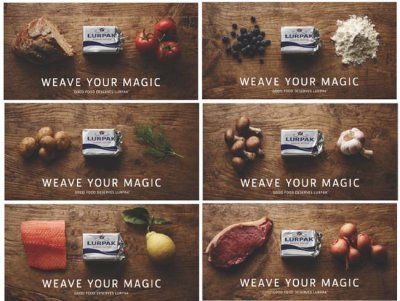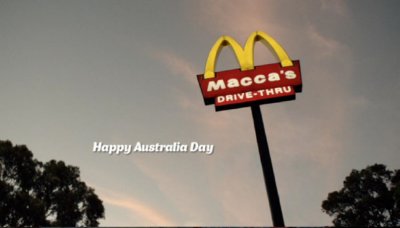The Cannes Creative Effectiveness Lions 2014 were published on warc.com last week. The awards honour creativity which has shown a measurable and proven impact on a client's business – creativity that affects consumer behaviour, brand equity, sales, and where identifiable, profit. The winners were V/Line, Lurpak, Depaul UK, Expedia, McDonald’s Australia, Dove, and Virgin Mobile. While I have highlighted a handful of the winners I have also dug a little deeper into the 80-strong case studies to surface some lesser-known campaigns – ones where the strategy and thinking are worth shouting about. And as we’re in the midst of the 2014 World Cup I have selected a couple of campaigns that leverage the power of football to make the world a better place. Warc subscribers can access all 80 case studies here.
Lurpak: Weave your magic - How Lurpak found its global voice
Lurpak, the butter brand, shows how a clearly defined and strong brand positioning can drive value and volume growth in a low-interest category. Lurpak targeted ‘creative foodies’ in this global campaign. Outstanding creative shows the cook as the hero, not just a creator of food, but someone who has the power, with the help of Lurpak, to transform the ordinary into the extraordinary, one who can create… magic.

The Depaul Box Company: Don't raise money, make money
Depaul UK, a charity that helps young homeless people, developed an innovative fundraising model for the not-for-profit sector by founding the Depaul Box Company. Aimed at house-movers, the charity found a way to be useful while driving home the homeless message. The boxes were the canvas for storytelling, reminding people that when buying Depaul boxes they weren’t just solving the logistics of moving house, they were contributing to a worthy cause in the process. Over 9,000 boxes were sold, equating to over £19,000 in revenue.
McDonald's Australia: Australia Day - From McDonald's to Macca's
McDonald’s, the fast food chain, wanted to stimulate sales and generate buzz in January, a typically promotion-saturated and cost-conscious month. In honour of Australia Day, 26th January, McDonald’s Australia tapped into local culture by officially becoming known as Macca’s, the name by which it is commonly known in Australia. ‘Macca's' launched a menu of uniquely Australian products and social media and PR were instrumental in encouraging both customers and staff to take ownership of the idea. Year-on-year sales increased across the board, not just on the promotional products.

The University of Engineering and Technology: Potable Water Generator
The University of Engineering and Technology (UTEC) in Peru needed to build awareness and boost admissions. The best way to attract the attention of its target of affluent teens was to advertise on a particular stretch of highway, but UTEC need to be creatively outstanding: this particular highway is home to some 380 billboards across 80 kilometers. UTEC cut through the noise by building and installing the world’s first billboard that produces portable water from air humidity, with the water then used by inhabitants of impoverished surrounding villages. The idea generated massive earned media, a YouTube video ultimately gained 3m views, while the university's website gained 100,000 visitors and applications increased 38% year on year.
With 24% of children under the age of one not enrolled in civil registration, UNICEF, the UN's children's charity, targeted Paraguayan presidential candidates, urging them to ensure the children of Paraguay received an official ID. UNICEF used a crucial 2014 football World Cup qualification match to draw attention to the issue. During the first few minutes of the match, TV and radio coverage did not mention the player's names driving home the message – through the power of silence - that like the players, children need a name and a nationality. Strong PR and Twitter support helped drive political change. 4m of Paraguay's 7m population were exposed to the campaign, and, the incoming president subsequently made an official commitment to invest in children. Silence, it seems, can speak volumes in a noise saturated world.
Sport Club Recife: Immortal Fans
Sport Club Recife, a Brazilian football team, raised awareness about the importance of organ donation, by engaging football fans. The club released an 'Immortal Fans' Organ Donor Card to allow fans to keep their passion for their club alive – even after death - through organ donation. The card was launched at a match, when players went out onto the field hand in hand with actual patients. Media efforts included TV, radio, outdoor, local press, social media and posters in popular bars and hospitals. 51,000 organ donor cards were issued and there was an increase in actual organ donations. Interestingly, institutions from other countries have expressed an interest in replicating the idea.
How does a challenger brand stand-out in a low-interest category? Le Trèfle, a French toilet paper brand, used humour to convey its message – that paper still has a very important role to play, even in a digitally dominant world. Did the message get panned? Not quite. The film generated 25 million views in 10 days and sales more than doubled.
UPS, the logistics company, used sport sponsorship to reach a B2B target audience and boost brand love among small and medium-sized businesses in the US. Rather than simply slap its logo on to sports, UPS wanted to impart some fresh knowledge about the sports its target loved, thereby adding value and a new understanding about the power of logistics. TV ads, in-game programming and an innovative Team Performance Index tool, along with star brand ambassadors from American football and basketball drove the “winning with logistics” message.
Expedia, the online travel agency, wanted to differentiate itself from other travel agencies in the US. The emotive 'Find Yours' campaign celebrated the powerful, transformational nature of travel. An anthemic TV spot created entirely from user-generated content featured a variety of travellers telling their stories about how travelling enriched their lives. And Expedia found its political voice via an online video, ‘Find Your Understanding’ which positioned the brand as a supporter of marriage equality. The emotive film follows a father’s journey as he travels to his daughter’s same-sex wedding ceremony. The ad was recognised as one of TED’s Ads worth spreading. Travellers were invited to submit their own stories on Expedia’s social media platforms and the campaign also involved an internal marketing push to engage employees. The campaign improved employee satisfaction, preserved Expedia's leadership position and grew revenue year-on-year.

Vicks ZzzQuil sleep aid launch
This case study demonstrates how Procter & Gamble (P&G) launched Vicks ZzzQuil, a sleep aid medication in the US. The objective was to enter and lead the OTC sleep aid category. The strategy focused on a positive message that everyone deserves a great night's sleep. The campaign targeted specific segments such as business travellers and high-stress professionals. A partnership with the National Sleep Foundation and WebMD helped position the brand as an expert and authority on sleep. ZzzQuil became the category leader within four months and maintained it through the launch year.

